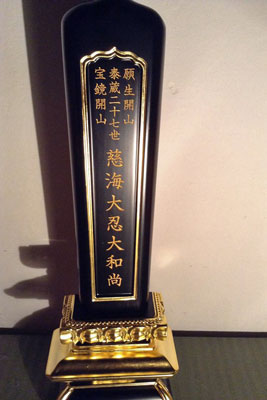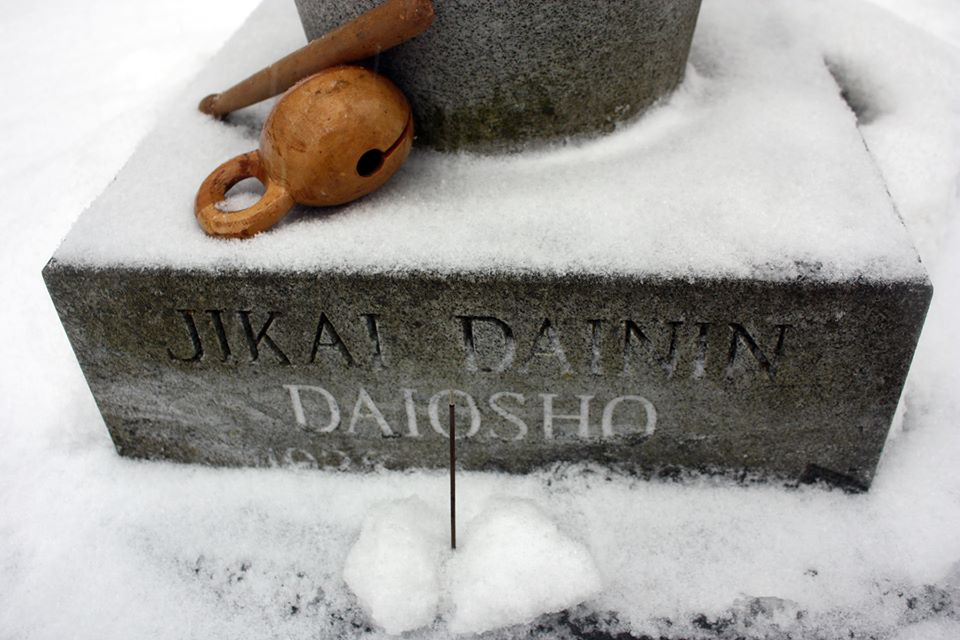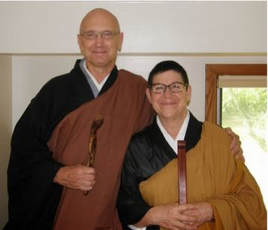|
Teijo Munnich, abbess of Great Tree Zen Temple in Asheville, North Carolina, recently performed a memorial service for Katagiri Roshi and placed an ihai memorial tablet (there’s a photo of it at the end of this post) on the altar at Fudenji in Salsomaggiore, Italy. Right before that, she performed a ceremony to “open the eyes” of the tablet, when it’s customary to speak directly to the item. Here are the moving words that Teijo spoke--
Jikai Dainin Daiosho (Compassionate Ocean, Great Patience, Great Priest) Tomorrow is the 25th anniversary of your passing from the human realm. This ihai is a reminder of your life, of your great patience and steadfast perseverance. We met in California almost 40 years ago; both of us were visitors from Minneapolis. Now I wear your okesa even with its wax stain on the front, I wear your kimono with mold stains which will not come out, and your teachings are still warm in my heart. You shared teachings in Japan and America and inspired many. And Taiten Roshi has shared some of your spirit in Fudenji in Italy, a place where you wanted to visit—but you died too soon. You told us, “Please don’t call me ‘Zen Master.’ No one can master Zen.” And you also said, “Do not make me into a god after I die.” Your humanness was your greatest teaching. Your mistakes were an encouragement to your students. Your continuous effort was your greatest gift. Compassionate Ocean Great Patience, we bow to you in gratitude for your example. And we vow to make our best effort to continue the pure Dharma you embodied. So, how did this come about? In November 1988, Katagiri Roshi was head teacher of the Tokubetsu sesshin, a month-long retreat that brought together Western and Eastern Zen teachers. One of those Westerners was Taiten Guareschi, abbot of Fudenji, who found practicing with Katagiri to be a transformative experience. In remembrance of their connection, he wanted to honor the 25th anniversary of Katagiri’s passing. Yes, in America we honored the 24th anniversary on March 1, but in the Japanese way of counting, the first anniversary of an event is when it happens. For this memorial, a traditional ihai would be ceremonially placed on his temple’s altar. Taiten felt this was best done by one of Katagiri’s dharma heirs, so he talked about it with his friend Shuichi Tom Kurai, an American monk and taiko drummer who had also attended that Tokubetsu sesshin. Tom suggested his friend Teijo. Teijo called on Shohaku Okumura for help with the Japanese characters, and with Tom’s help she arranged for the making of the ihai. She reported that it was an object of great curiosity in the four airport security scanners it had to pass through on their trip to Italy. Lovely photo of Katagiri Roshi’s gravesite posted on Hokyoji’s Facebook page today with this dedication:
“Today marks the 24th anniversary of the passing of Hokyoji founder Dainin Katagiri into Nirvana. May we acknowledge his great benevolence and show respect for him so that it may enhance the practice of the Buddha Way.” Tomoe Katagiri, our much-loved master of nyoho-e (Buddha’s teaching represented in clothing), recently retired from active teaching. Tomoe-san has taught generations of students to sew rakusu, okesa, robes, and more, sharing not only skills and wisdom but also her great warm heart. As Katagiri Roshi’s wife, Tomoe was a tireless leader of many aspects of sangha life, and since his death she has continued to support his lineage in many ways.
Tomoe named three successors. Kaaren Wiken is a metal sculpture artist and Zen sewing teacher who lives in Wisconsin and travels to Zen centers to lead sewing retreats. Tracey Walen is a priest at Clouds in Water Zen Center in Saint Paul. Rosemary Taylor is a priest at MZMC. Tomoe’s legacy includes her book, Study of the Okesa, which has guided countless dharma students through their sewing projects. Fortunately, Tomoe’s health is good and she will continue to be a welcome presence in the Zen community. In gassho, Andrea Lately I’ve been thinking that Katagiri happened to arrive at an extraordinary moment in our country’s history. He landed in Los Angeles just six weeks after Martin Luther King gave his “I have a dream speech” at the civil rights march on Washington, and six weeks before President John F. Kennedy was assassinated in Dallas. It was a tumultuous time. Our local Minneapolis paper recently ran a series of articles looking at all the ways that 1963 marked the start of a new era of history and culture, including Beatle mania, the rise of feminism, and a profound reassessment of traditional respect for power and authority. You can read the series at www.startribune.com/1963.
1963 was also the year that Soto Zen Bishop Reirin Yamada launched the Zen Buddhist Study Institute in Los Angeles and brought 35-year-old Katagiri from Japan to be part of his program. Tomoe has said that after a couple of years in LA and San Francisco, Katagiri began to doubt that he belonged in America and considered returning to Japan. Fortunately she was confident that they should stay. So he continued his effort to look beyond any particular human culture to find and teach the best way of human life. Many thanks to Marc Fisher for sending this touching Katagiri Roshi story:
“In the spring of 1969, in Berkeley, California, my very first morning zazen was with Katagiri, who was affiliated with San Francisco Zen Center. As part of our breakfast that followed our sitting, we ate in sitting position but slightly relaxed. The first part of our meal was cantaloupe, say about a sixteenth of a whole. I was seated directly in front of Katagiri. There was a great contrast between my messy scoop work, causing dripping galore, and Katagiri’s pristine scoop work, most surgical and jewel-like in nature. That contrast was revelation enough to inspire me to take up an ardent sitting practice.” Congratulations to Eko Jeff Kelley on his dharma transmission from Byakuren Judith Ragir, guiding teacher at Clouds in Water Zen Center, St. Paul. The ceremony took place this summer at Hokyoji Zen Practice Center. Eko lives in Seattle, where he is a teacher and leader at the Seattle Soto Zen Center.
This spring, Shinkai Bonnie VersbonCoeur received dharma transmission from Zentetsu Tim Burkett at the Minnesota Zen Meditation Center in Minneapolis. Shinkai teaches and practices in Minneapolis and her home base of Belfast, Maine. Congratulations Shinkai! The Dainin Katagiri lineage chart is maintained on this website under the Biography tab as part of “Ceaseless Effort.” You can find it within that document as an appendix. Currently it appears on pages 26-27. Reports of updates to this lineage record are most welcome. Lately I’ve enjoyed some great Katagiri stories told by his dharma heirs. These stories renew Katagiri Roshi’s life for me and I really appreciate them.
Dokai Georgesen of Hokyoji wrote the essay “Not Bad Is Good Enough” for their blog. Dosho Port of Wild Fox Zen often tells Katagiri stories in his blog postings. His January 20 entry is “Sweet Dreams Are Made of This” and on October 28 he posted “It’s Not So Easy.” Find more of Dosho’s Katagiri stories using the “Search Wild Fox Zen” feature. Teijo Munnich at Great Tree Zen Temple writes about Katagiri in their newsletter. These links take you to PDF versions of the newsletter, then scroll down to the stories on page 2. They are “Flowers of Truth,” “Pulling Me Up the Mountain” and “Chalky Dust.” (Bonus: the front page of this issue has photos of Tomoe Katagiri.) Your stories are welcome here! If you have a Katagiri story you’d like to share, post it in the comments area below or send me an email via the Contact tab. Peace, Andrea Today is Katagiri Roshi’s birthday. He would have been eighty-five. Not so old, really. I think of him everytime I’m driving my car and see a dead animal on the road. That’s because whenever he was riding as a passenger and saw an animal lying dead, he raised his hands and offered it a solemn gassho. No matter how tired he might be after a week-long sesshin at Hokyoji, or how sick he was feeling from chemotherapy, he would show respect for the animal’s suffering. Ever since I saw him do this, I’ve followed my own version of his practice. I nod my head to dead animals, accepting their reminder of impermanence, and appreciating the lesson I learned from my Roadkill Roshi. In peace, Andrea
December 15 is the 40th anniversary of Katagiri Roshi’s 1972 arrival in Minnesota, along with his wife Tomoe and their two sons. He lived and taught here for eighteen years until his death in 1990. Teijo Munnich sent this poem that Katagiri Roshi wrote on March 13, 1989, soon after learning that he had cancer:
The sage is life, The stone is alive and walking with you; Mountains, rivers, pebbles, trees, flowers, All are walking with you. At that time everyday life walks with you side by side. Many thanks to Gary Webb for this delightful account of meeting Katagiri Roshi. If you have a Katagiri story to tell, you are invited to post it on this blog (click below on “Leave a comment”) or get in touch with me through the Contact tab or by mail. Peace, Andrea
From Gary Webb: One day in 1986, when I was living at Marpa House in Boulder, Colorado, I was asked to show a special guest around the center. I was somewhat shy but at peace as I showed Katagiri Roshi around. At one point we crossed paths with the statue of a bodhisattva, which was approximately four feet tall on a pedestal. Roshi paused, folded his hands, and bowed to the statue. So naturally I did the same. After touring the shrine halls and public spaces, we again came upon the statue. Once again we folded our hands and bowed. Thereafter I always bowed to the bodhisattva in the hall and thought of Roshi. In 2000, I was blessed with the opportunity to spend the summer practicing at Marpa House. Upon my arrival one of the veteran students gave me a tour of the place. As we came upon that same bodhisattva statue, my guide stopped and with folded hands bowed and said to me, “There are many paintings and statues of the buddhas and bodhisattvas here, but for some reason we always stop and bow to this one. Don’t ask why, no one knows. I’ve asked everyone, even the director of the center, but nobody knows. But because it’s a house tradition we all bow.” |




